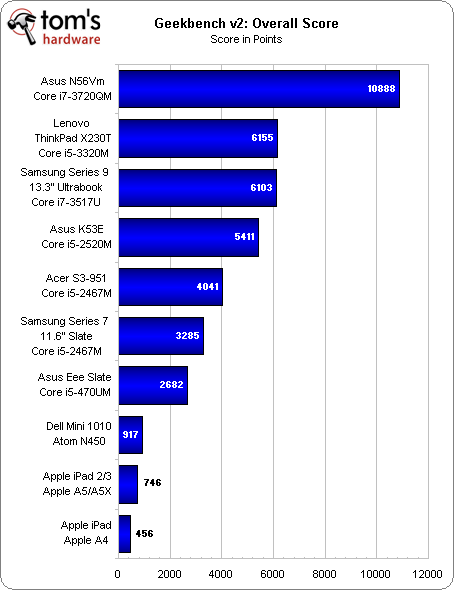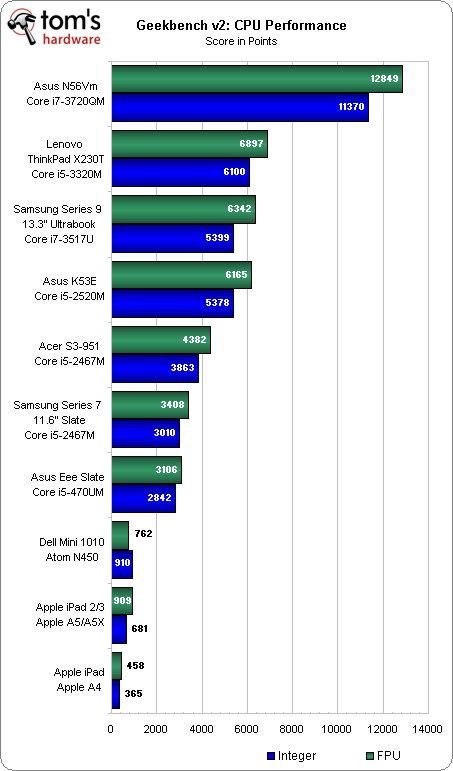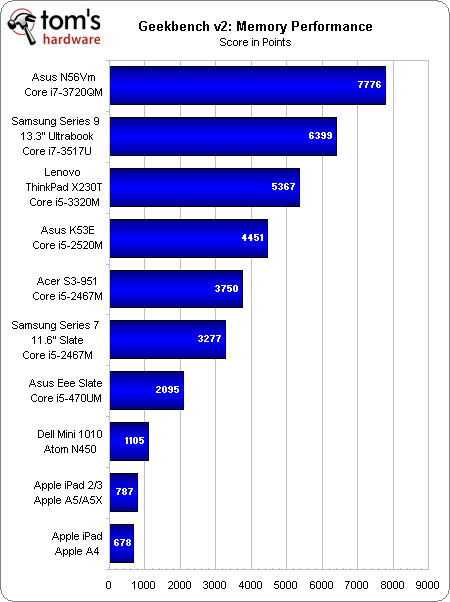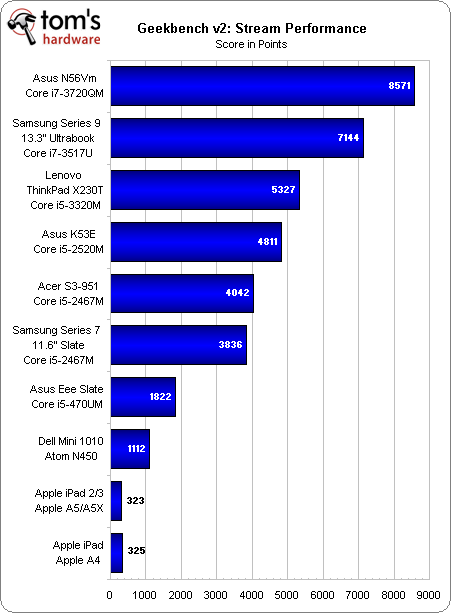Samsung's Series 9 13.3" Ultrabook For 2012: Thinner And Lighter
Series 9 Processor Performance: Mobile Ivy Bridge Delivers
Overall, mobile Ivy Bridge-based processors are only marginally faster than their Sandy Bridge-based predecessors. We covered them in depth in Second-Generation Ultrabooks: Faster And Cheaper With Ivy Bridge. Consequently, the results in our synthetic GeekBench test shouldn't come as a surprise. However, it's interesting to compare performance to the power consumption of these new chips manufactured on a 22 nm node.
The 2.6 GHz Core i5-3320M in Lenovo's ThinkPad X230T bears a 35 W TDP, suiting it to more mainstream mobile platforms able to accommodate larger batteries. In comparison, the 17 W Core i7-3517U in Samsung's Series 9 is built with the more limited dimensions of an Ultrabook in mind. It's the enabler, if you will, of the up-to-nine-hour battery life claims. With that said, performance clearly isn't a problem for the Core i7, which roughly matches (and sometimes exceeds) the more power-liberal Core i5-3320M.
How do you end up with a 17 W Core i7 and a 35 W Core i5 in the first place? Both are dual-core CPUs with Hyper-Threading technology enabled, scheduling to four threads at a time. The Core i7 gets an extra 1 MB of shared L3 cache (4 MB to the Core i5's 3 MB). Where it saves power, however, is its 1.9 GHz based clock rate. The i5 starts at a more aggressive 2.6 GHz. Similarly, the Core i7's HD Graphics 4000 engine throttles all the way down to 350 MHz, while the i5 starts at 650 MHz. Turbo Boost takes both quite a bit higher when the thermal headroom allows, which is one reason we see a close finish between the ThinkPad and Series 9.
Get Tom's Hardware's best news and in-depth reviews, straight to your inbox.
Current page: Series 9 Processor Performance: Mobile Ivy Bridge Delivers
Prev Page Samsung 13.3" Series 9: Now With Ivy Bridge-Based CPUs Next Page Benchmark Results: PCMark 7 And Battlefield 3-
mayankleoboy1 Is the QS balance between quality/speed determined by any OEM customised driver ?Reply
Because this samsung notebook takes more time than other i7's in 'quality' setting, but lesser time in 'performance' settings.
-
mayankleoboy1 in the screen quality/brightness benchmark, why u no compare with the new rMBP ?Reply -
joytech22 esreverDon't samsung ultra books overheat a lot?What..? No. That's the dell's and I'm not even joking.Reply
I was watching a demo and their Dell XPS ultrabooks with GT640's in them continuously overheated during the demos and lowered the FPS catastrophically low.
They have these ultrabooks at my local Jb HiFi (Well.. the i5 version at least) and it was cool to the touch and very solid (I've noticed even Acer's ultrabooks don't feel flimsy as sh*t like their notebooks). -
Yargnit Looks awesome, but unfortunately the 'ASUS Zenbook Prime UX31A' simply trounces it on a price/performance ratio. If there was a base model out for under $1200, preferably at $1000 like the Asus it'd be a very solid option. But the Asus for $1000 is just such a better value that it kind of make this look like a weak effort, which is too bad because it actually looks like a solid system.Reply -
ojas BTW i wish you'd have included a desktop processor's QuickSync benchmark for reference...Reply -
ojas Hmmm...interesting, one of the most positive review's i've seen of an ultrabook-class notebook...i just have two questions:Reply
1)Is the touchpad annoying? Compared to Apple's touchpads, for example.
2)Can you keep it in your lap, sitting or lying down slightly (you know, with the notebook against your knees)? Or does it get too warm?
These two are deal breakers for me, personally. So is the keyboard, but you've clearly stated what's wrong with that (touchpad too, but just wanted to know if it's a noticeable annoyance). -
veroxious BTW why was the Asus UX31A not used in the comparative benchmarks? We have the same form factor, Ivy Bridge i7 processor, 256GB SSD BUT the Asus sports a Full HD IPS panel that really impressed me for less money.Reply -
cangelini mayankleoboy1in the screen quality/brightness benchmark, why u no compare with the new rMBP ?I haven't gone out to buy one yet :)Reply



